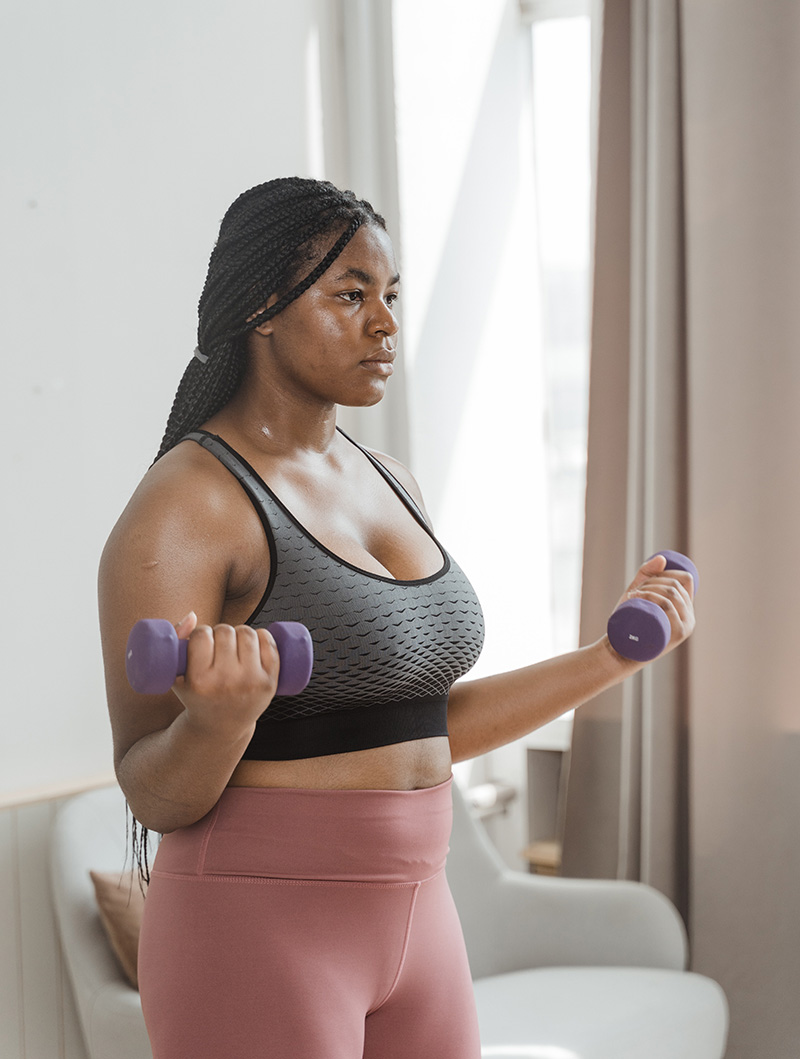Most of us know the health benefits of fitness and exercise. The first perks that may come to mind are weight management, strengthening muscles, cardiovascular health, and reduced risk of chronic diseases, including heart disease and diabetes.1 Although these are major benefits to physical activity, you may not be aware of additional benefits that are significant as well. Some of the lesser known impacts that fitness has on health includes cognitive effects, digestion, sleep, and self-esteem. Let’s dig deeper into each of these!

Cognitive Benefits
Robust data from research studies demonstrates exercise improves mood, memory and cognition, as well as reduces depression and anxiety.1 Some of the benefits of fitness are derived from increased blood flow to the brain that occurs during exercise, delivering ample nutrients to nourish and enhance brain function.2 The reduction in stress and improved mood is primarily derived from released endorphins, the “feel good” hormones, and decreased number of stress receptors in the hippocampus (located in the temporal lobe) of the brain.2 The neurological benefits are not limited to short term effects either. Aerobic exercise physically alters the brain by stimulating growth of new blood vessels and brain cells, reducing dementia risk.3

Digestive Benefits
Physical activity increases transit time of food through the digestive tract by stimulating gastrointestinal mobility.4 This effect reduces the risk of digestive tract cancers, improves constipation, and improves insulin sensitivity.4 For individuals with Irritable Bowel Syndrome (IBS), research supports the role of exercise in reducing symptom severity.5 Whether you struggle with bowel regularity or strive for general preventative health, physical activity is important to incorporate into your weekly routine.
Sleep Benefits
Both adequate duration and adequate quality of sleep is crucial for almost every aspect of health. Exercise, particularly aerobic exercise, can help you fall asleep more quickly and stay asleep during the night.6 However, exercise timing may impact these sleep perks as well. For some people, working out close to bedtime can create difficulty falling asleep due to the release of endorphins and rise in core body temperature during aerobic exercise. Endorphins create a level of activity in the brain for 1-2 hours following exercise that can cause alertness – A good thing during the day, but not when you’re trying to sleep. The elevation in core body temperature from a high heart rate during physical activity can also last up to 1.5 hours post-exercise, which signals the body that it’s time to be awake. Overall, the impact of exercise timing on sleep improvements does not appear to matter, as long as the activity is completed by 1-2 hours before going to sleep.6 So whether you are a morning or afternoon exerciser, feel confident you are reaping sleep benefits!
Self-Confidence Benefits
Regular physical activity can both directly and indirectly improve self-confidence. Even better, these benefits remain significant regardless of whether the exercise changes BMI or body weight. One research study found that perceived personal fitness is directly related to body image and self-esteem, possibly through the opportunity that physical activity creates to enhance muscle tone, strength, coordination, flexibility and balance.7 Furthermore, while both cardio and strength training can improve self-esteem, strength training appears to have a more robust effect. The Gallup-Healthways Well-Being Index, which gathers data from interviews of 80,000 Americans, also found a direct correlation between exercise frequency and perception of physical appearance.8 In other words, the more days per week someone exercises, the higher someone’s self-confidence on average from this study group. While the exact causal mechanism cannot be drawn from this study, it’s hypothesized that the release of endorphins, the “feel good” hormones, act to reduce stress, anxiety and depression, may contribute to this effect. Regardless of the exact mechanism, it is clear that there are many more pros than cons to adding more physical activity into your daily life!

In Conclusion
In conclusion, the research on the benefits of fitness and exercise continues to expand, and spans far beyond weight management. If possible, include a combination of strength and cardio on a weekly basis with a minimum of 150 minutes per week (or 30 minutes five days per week) to enhance the physical and mental benefits. Having trouble finding physical activity that you enjoy? Consider trying something new, such as group fitness classes, local running groups, less traditional gyms (including rock climbing, boxing, hot yoga), or find a workout accountability partner. Looking for more strategies or information? Reach out to a Nutrition Healthworks dietitian for strategies to incorporate enjoyable, sustainable exercise routine into your weekly schedule – And notice the improvements in your cognition, digestion, sleep, and confidence!

Lydia Averette
MS, RD, LDN
Lydia is a Licensed and Registered Dietitian Nutritionist who enjoys counseling clients with diverse backgrounds. She obtained her B.S. in Nutrition Sciences at NC State University with a Minor in Sports Science and her M.S. in Foods and Nutrition at The University of Georgia.
Sources:
-
1. Benefits of Physical Activity. Centers for Disease Control and Prevention. Published June 16, 2022. Accessed March 14, 2023. https://www.cdc.gov/physicalactivity/basics/pa-health/index.htm
2. How Exercise Affects the Brain. BYU: College of Life Sciences. Published February 8, 2021. Accessed March 14, 2023. https://lifesciences.byu.edu/how-exercise-affects-your-brain
3. Regular Exercise Changes the Brain to Improve Memory, Thinking Skills. Harvard Medical School. Published April 9, 2014. Accessed March 14, 2023. https://www.health.harvard.edu/blog/regular-exercise-changes-brain-improve-memory-thinking-skills-201404097110
4. Fangfang X, Yanli Y, Jihan H, Chong G, Ziji C, Min F, Fei Y, Jia H. Association between physical activity and digestive-system cancer: An updated systematic review and meta-analysis. JSHS. 2021;10(1):4-13.
5. Exercise and the Gastrointestinal System: How Digestion is Affected by Movement. National Federation of Personal Trainers. Published June 14, 2021. Accessed March 14, 2023. https://www.nfpt.com/blog/exercise-gi-system-digestion
6. Exercising for Better Sleep. Johns Hopkins Medicine. Published 2023. Accessed March 14, 2023. https://www.hopkinsmedicine.org/health/wellness-and-prevention/exercising-for-better-sleep#:~:text=Research%20Shows%20Exercise%20Decreases%20Insomnia,to%20those%20of%20sleeping%20pills.
7. Zamani SH S, Fathirezaie Z, Brand S, Pühse U, Holsboer-Trachsler E, Gerber M, Talepasand S. Physical activity and self-esteem: testing direct and indirect relationships associated with psychological and physical mechanisms. Neuropsychiatr Dis Treat. 2016; 12:2617-2625.
8. Americans Who Exercise Most Feel Best About Appearance: Link between exercising regularly and feeling good about appearance. Gallup.com. Published July 18, 2014. Accessed March 14, 2023. https://news.gallup.com/poll/173948/americans-exercise-feel-best-appearance.aspx?ref=image
